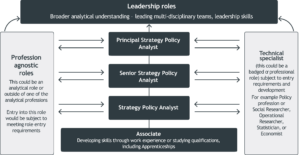Role profile: strategy policy analyst
Strategy policy analysts use available data, evidence, and analysis to understand the situation and assess likely scenarios following policy implementation. They address complex policy issues using strategic and analytical skills.
Strategy policy analysts are informed by:
- quantitative and qualitative analysis
- political, economic, sociological, technological, environmental, and legal awareness
They help to develop practical, original, politically well-judged policies. Strategy policy analysts have a range of analytical skills drawing on a broad range of techniques, approaches and experiences to build a coherent and powerful evidence base that will inform strategy.
Typical role responsibilities
Strategy policy analysts:
- collect, analyse, interpret and present evidence to form comprehensive policy proposals and approaches
- undertake or commission research, stakeholder engagement activities, strategy development activities
- translate messages into effective communications
- analyse information, identify key drivers, and apply wider policy and strategic context to the interpretation and presentation of data
- undertake high quality research involving the development of the evidence base and analysis to support policy creation and progression
- use a range of evidence and research to support the development of policy options — this includes working with analytical and policy specialists to ensure that policies are aligned to outcomes
- work on agreed policy development initiatives, including stakeholder engagement, communication, analysis, reporting and evaluation in line with Analysis Function Standards
- work across teams to produce the best available evidence and understanding of operational implications when developing and reviewing policy
Skills
There are several important skills that strategy policy analysts need to be successful in their role.
Find out more about skill level definitions.
You must:
- have knowledge of quantitative and qualitative research methods
- understand research methods can be applied to the production and presentation of evidence to support policy formulation
You will be expected to demonstrate these skills at different levels depending on the seniority of your role.
Associate strategy policy analyst
As an associate strategy policy analyst, you must have an “awareness” skill level.
Strategy policy analyst
As a strategy policy analyst, you must have a “practitioner” skill level.
Senior strategy policy analyst
As a senior strategy policy analyst, you must have an “expert” skill level.
Principal strategy policy analyst
As a principal strategy policy analyst, you must have an “expert” skill level.
You must be able to:
- use technical and analytical expertise to advise on how best to prioritise and gather the evidence-base
- use sound judgement and critical thinking to analyse and deal with complex issues and developing options
- identify risks and benefits to make recommendations
You will be expected to demonstrate these skills at different levels depending on the seniority of your role.
Associate strategy policy analyst
As an associate strategy policy analyst, you must have an “awareness” skill level.
Strategy policy analyst
As a strategy policy analyst, you must have a “practitioner” skill level.
Senior strategy policy analyst
As a senior strategy policy analyst, you must have an “expert” skill level.
Principal strategy policy analyst
As a principal strategy policy analyst, you must have an “expert” skill level.
You must:
- have excellent communication and interpersonal skills
- be able to communicate complex analysis clearly and confidently and summarise documents to share data insights and support decision making – you should be able to do this both verbally and in writing
- be able to communicate information to non-specialists and contribute effectively to discussions with ministers, senior officials and external stakeholders to highlight important policy implications
You will be expected to demonstrate these skills at different levels depending on the seniority of your role.
Associate strategy policy analyst
As an associate strategy policy analyst, you must have an “awareness” skill level.
Strategy policy analyst
As a strategy policy analyst, you must have a “practitioner” skill level.
Senior strategy policy analyst
As a senior strategy policy analyst, you must have an “expert” skill level.
Principal strategy policy analyst
As a principal strategy policy analyst, you must have an “expert” skill level.
You must be able to:
- demonstrate proven ability to manage the work involved to complete complex projects
- produce quality outcomes to deadline and identify risks
You will be expected to demonstrate these skills at different levels depending on the seniority of your role.
Associate strategy policy analyst
As an associate strategy policy analyst, you must have an “awareness” skill level.
Strategy policy analyst
As a strategy policy analyst, you must have a “working” skill level.
Senior strategy policy analyst
As a senior strategy policy analyst, you must have a “practitioner” skill level.
Principal strategy policy analyst
As a principal strategy policy analyst, you must have an “expert” skill level.
Sample career pathway
The strategy policy analyst career path shows some of the common entry and exit points in the role. It also shows the typical skill levels needed.
You can enter a strategy policy analyst role from another analytical profession or other professions, such as the policy profession. You can also exit the role to join another profession.

The diagram shows a potential career path. It shows that you can enter or leave a role from a wide range of backgrounds and experience levels. For example, you could become a strategy policy analyst by developing your skills in an associate role. You could continue to move up the levels in the career path by taking on more senior strategy policy analyst roles. Or you could develop your skills by working in a technical specialist role in an analytical or digital profession. You could also develop the necessary skills by working in a profession agnostic role outside of these professions.
A role that could be done by any person with the relevant skills or experience from any profession.
This could be a ‘badged’ or professional role that is subject to entry requirements and development.
Beyond the principal strategy policy analyst role, you could go into more senior leadership roles. These roles require broader analytical understanding, and the ability to lead multi-disciplinary teams.
